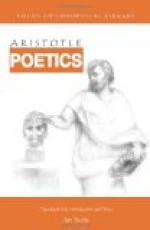But again, Tragedy is an imitation not only of a complete action, but of events inspiring fear or pity. Such an effect is best produced when the events come on us by sunrise; and the effect is heightened when, at the same time, they follow as cause and effect. The tragic wonder will thee be greater than if they happened of themselves or by accident; for even coincidences are most striking when they have an air of design. We may instance the statue of Mitys at Argos, which fell upon his murderer while he was a spectator at a festival, and killed him. Such events seem not to be due to mere chance. Plots, therefore, constructed on these principles are necessarily the best.
X
Plots are either Simple or Complex, for the actions in real life, of which the plots are an imitation, obviously show a similar distinction. An action which is one and continuous in the sense above defined, I call Simple, when the change of fortune takes place without Reversal of the Situation and without Recognition.
A Complex action is one in which the change is accompanied by such Reversal, or by Recognition, or by both. These last should arise from the internal structure of the plot, so that what follows should be the necessary or probable result of the preceding action. It makes all the difference whether any given event is a case of propter hoc or post hoc.
XI
Reversal of the Situation is a change by which the action veers round to its opposite, subject always to our rule of probability or necessity. Thus in the Oedipus, the messenger comes to cheer Oedipus and free him from his alarms about his mother, but by revealing who he is, he produces the opposite effect. Again in the Lynceus, Lynceus is being led away to his death, and Danaus goes with him, meaning, to slay him; but the outcome of the preceding incidents is that Danaus is killed and Lynceus saved. Recognition, as the name indicates, is a change from ignorance to knowledge, producing love or hate between the persons destined by the poet for good or bad fortune. The best form of recognition is coincident with a Reversal of the Situation, as in the Oedipus. There are indeed other forms. Even inanimate things of the most trivial kind may in a sense be objects of recognition. Again, we may recognise or discover whether a person has done a thing or not. But the recognition which is most intimately connected with the plot and action is, as we have said, the recognition of persons. This recognition, combined, with Reversal, will produce either pity or fear; and actions producing these effects are those which, by our definition, Tragedy represents. Moreover, it is upon such situations that the issues of good or bad fortune will depend. Recognition, then, being between persons, it may happen that one person only is recognised by the other-when the latter is already known—or it may be necessary that the recognition should be on both sides. Thus Iphigenia is revealed to Orestes by the sending of the letter; but another act of recognition is required to make Orestes known to Iphigenia.




